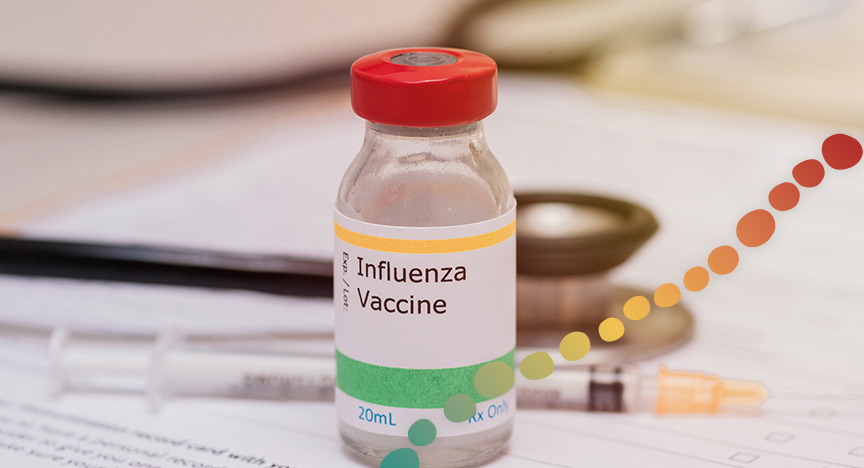
Summary
- Residents are urged to protect themselves and their children against respiratory infections this winter
- TCHHS has had 81 cases of influenza this year
- Vaccinations are available for influenza and COVID-19
With winter approaching, Cape York, Torres Strait, and Northern Peninsula Area residents are being urged to ensure they protect themselves and their children against a range of respiratory infections.
Torres and Cape Hospital and Health Service Public Health Medical Officer Dr Allison Hempenstall said various respiratory diseases, including influenza – the flu – and COVID-19 continued to circulate.
So far this year, 81 laboratory-confirmed cases of influenza had been recorded, compared with 182 for the same period last year, along with 105 cases of COVID-19 to date (107 for the same period last year).
Dr Hempenstall said the flu and COVID-19 could be serious illnesses, especially for high-risk people like young children, old people, pregnant women, and people with some illnesses – like breathing problems or diabetes.
“As always, vaccination remains our best protection against respiratory conditions like influenza and COVID–19,’’ she said.
Influenza
“This year, as last year, the State Government has made the flu vaccine available free to all Queenslanders and not just those in at-risk groups.
“It is recommended that everyone aged six months and older get a flu vaccine this year – it is the single most important measure many of us can take to protect each other.
“Young people in particular play an important role in getting vaccinated as they are considered super- spreaders.
“You need to be vaccinated every year to keep yourself protected because flu strains change annually, and you will not be immune to these new strains which are covered in this year’s vaccine.
“This year’s seasonal flu vaccine is now readily available and I encourage everyone to take the opportunity protect themselves and be vaccinated.
“As well as at GPs and pharmacies, the free vaccines are available through all primary health centres in the Torres Strait, Cape York, and Northern Peninsula Area, as well as at clinics at Thursday Island and Bamaga hospitals, the Weipa Integrated Health Service, and the Cooktown Multipurpose Health Service.
“Expanding access to flu vaccines to everyone has the potential to break the chain of transmission, so I encourage every Cape York, Torres Strait and NPA resident to take advantage of a free flu vaccination.’’
COVID-19
Dr Hempenstall said she also encouraged all residents to ensure their COVID-19 booster vaccinations were up date, with the free vaccine available through all primary health care centres in the region.
“While being vaccinated will not prevent you getting COVID-19, vaccination has been proven to reduce the severity of the illness and help keep you out of hospital and, especially, out of intensive care,’’ Dr Hempenstall said.
Read more about COVID-19 vaccines on the Australian Government website.
Pneumococcal
Dr Hempenstall said the health service also was encouraging everyone who was eligible to have their pneumococcal vaccine, available through all primary health care centres in the region, and free to at-risk groups.
“Pneumococcal disease is a bacterial infection. It is especially serious for young children and older people,’’ she said.
“It can cause pneumonia, bloodstream infection and meningitis - inflammation of the membranes around the brain. Vaccination is a safe and effective way to protect you from pneumococcal disease.’’
Read more about Pneumococcal vaccine on the Australian Government website.
Respiratory syncytial virus (RSV)
“We have also recorded 77 cases of Respiratory syncytial virus (RSV) so far this year, compared to 24 cases for the same period last year,’’ Dr Hempenstall said.
“A single RSV infection does not result in long-lasting protective immunity, and symptomatic illness tends to occur repetitively in children.
“While RSV can infect people of all ages, infants and young children are most at risk of contracting the disease and developing serious illness.
“Symptoms may include a runny nose, cough, fever, sore throat, and headache.
“Symptoms in infants and babies also can include irritability or tiredness, refusal to breast or bottle feed, weight loss, and working hard to breathe or fast breathing.’’
Read more about Respiratory syncytial virus (RSV) on the Queensland Government website.
Practise hygiene
“Good hygiene also is very important in preventing the spread of respiratory conditions like flu, COVID- 19 and RSV, as well as other infections,’’ Dr Hempenstall said.
“Always wash your hands with sanitiser, cover your coughs, put tissues straight in the bin and stay away from other people if you or they are sick.
“Practising social distancing by staying at least 1.5m away – think three big steps as recommended during the COVID-19 pandemic – will mean coughs and sneezes don’t reach another person’s face.
“Wearing a mask also is highly recommended to avoid transmitting a respiratory illness to others, or to protect yourself from people around you who might have a respiratory illness.
“If you get the flu, you should stay home and rest and drink plenty of fluids until symptoms have resolved, which is usually 5-7 days.
“If you or your family member is getting sicker, they may have fast or difficult breathing, have chest pains, be sleepy or say they are getting worse.
“If this happens, they should go to their doctor or clinic, as you may be suitable to receive anti-viral treatment.
“But you should seek care early, especially if you have other chronic conditions, as antivirals are only effective if started early – within the first couple of days of symptoms.’’